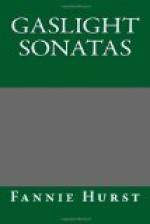Before one of these, for no particular reason distinguishable from the others, Mrs. Burkhardt stepped up two shallow steps and turned a key in the center of the door, which set up a buzz on its reverse side. Her hand, where it clutched the shawl at her throat, was reddening and roughening, the knuckles pushing up high and white. Waiting, she turned her back to the wind, her body hunched up against it.
There was a moving about within, the scrape of a match, and finally the door opening slightly, a figure peering out.
“It’s me, Mrs. Scogin—Hanna Burkhardt!”
The door swung back then, revealing a just-lighted parlor, opening, without introduction of hall, from the sidewalk.
“Well, if it ain’t Hanna Burkhardt! What you doin’ out this kind of a night? Come in. Kittie’s dryin’ her hair in the kitchen. Used to be she could sit on it, and it’s ruint from the scorchin’ curlin’-iron. I’ll call her. Sit down, Hanna. How’s Burkhardt? I’ll call her. Oh, Kittie! Kit-tie, Hanna Burkhardt’s here to see you.”
In the wide flare of the swinging lamp, revealing Mrs. Scogin’s parlor of chromo, china plaque, and crayon enlargement, sofa, whatnot, and wax bouquet embalmed under glass, Mrs. Burkhardt stood for a moment, blowing into her cupped hands, unwinding herself of shawl, something Niobian in her gesture.
“Yoo-hoo—it’s only me, Kit! Shall I come out?”
“Naw—just a minute; I’ll be in.”
Mrs. Scogin seated herself on the edge of the sofa, well forward, after the manner of those who relax but ill to the give of upholstery. She was like a study of what might have been the grandmother of one of Rembrandt’s studies of a grandmother. There were lines crawling over her face too manifold for even the etcher’s stroke, and over her little shriveling hands that were too bird-like for warmth. There is actually something avian comes with the years. In the frontal bone pushing itself forward, the cheeks receding, and the eyes still bright. There was yet that trenchant quality in Mrs. Scogin, in the voice and gaze of her.
“Sit down, Hanna.”
“Don’t care if I do.”
“You can lean back against that chair-bow.”
“Hate to muss it.”
“How’s Burkhardt?”
“All right.”
“He’s been made deacon—not?”
“Yeh.”
“If mine had lived, he’d the makin’ of a pillar. Once label a man with hard drinkin’, and it’s hard to get justice for him. There never was a man had more the makin’ of a pillar than mine, dead now these sixteen years and molderin’ in his grave for justice.”
“Yes, Mrs. Scogin.”
“You can lean back against that bow.”
“Thanks.”
“So Burkhardt’s been made deacon.”
“Three years already—you was at the church.”
“A deacon. Mine went to his grave too soon.”
“They said down at market to-day, Mrs. Scogin, that Addie Fitton knocked herself against the woodbin and has water on the knee.”




